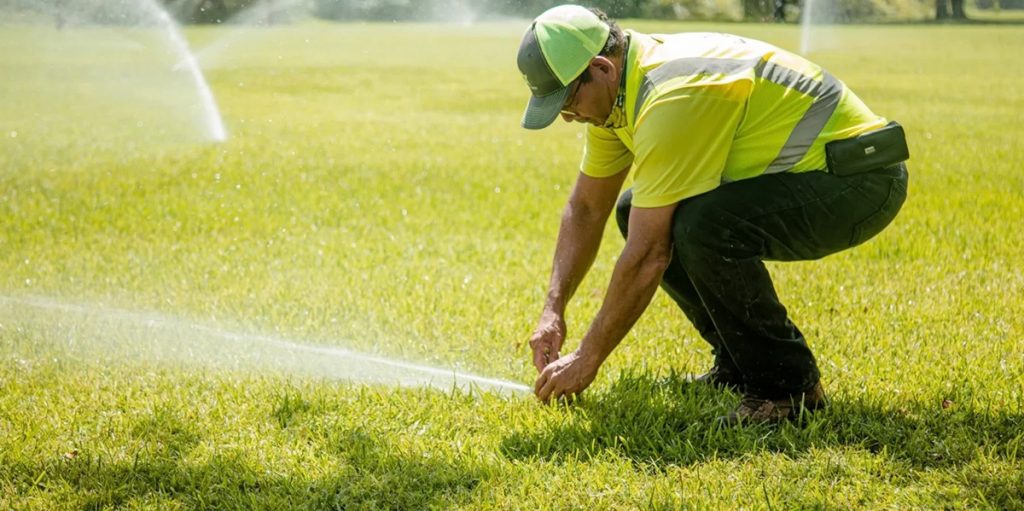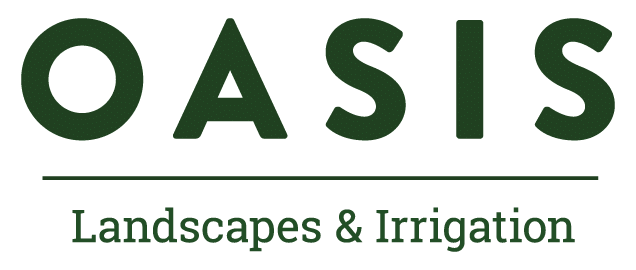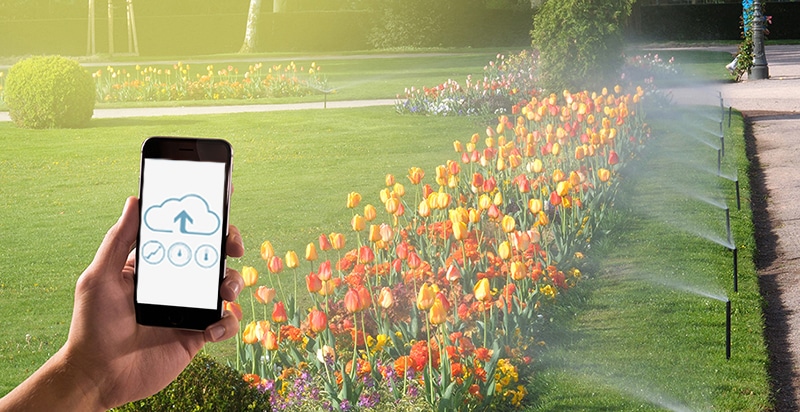The integration of modern technology into all aspects of what we do is on the rise, and irrigation is no different. Smart irrigation systems use modern technology to control when, where, and how much water an irrigation system delivers. These systems also provide remote monitoring, automatic alerts, and remote control of the system. A smart irrigation controller makes the task of irrigation easier and more efficient, while conserving an essential resource.
Conventional Verses Smart Irrigation Systems
Most of us are familiar with how to control our irrigation systems without smart technology. Traditional or conventional irrigation systems typically use timers or are occasionally done manually (as in hand-watering).
Many homeowners have their irrigation systems set on timers, where certain zones go on and off at certain times a day, for certain lengths of time. This delivers more or less amounts of water to different areas of our landscape, based on the plants in that area. This was a nice step up from turning our sprinkler systems off and on manually and is certainly a step up from watering with a hose (with or without a sprinkler attached to the end of it!).

The Disadvantage of Traditional Timed Irrigation Systems
The largest drawback of traditional timed irrigation systems is that they water the same amount regardless of the weather. And we all know, the weather can vary. When it is raining, there is no need for the sprinklers to be on, but a timed irrigation system will come on regardless. And conversely, when there is a hot, dry spell and your plants are needing more watering, a timed irrigation system will not automatically increase watering times. These systems need a person to go and adjust the watering to account for the weather – adjust the schedule or turn sprinklers off or on in the case of rain or a dry spell. The problem is, many of us are busy, and may forget to adjust the watering schedule, or adjust it back. It also is very difficult to know just how much to adjust the watering, to avoid over or under-watering.
Smart Irrigation Systems to the Rescue
This is where smart irrigation systems come in. Studies have shown that conventional methods of irrigation use of 50% more due to both inefficiencies in evaporation and overwatering.
Where rainfall is heavy, sporadic, and frequent, such as Florida for example, water waste can be reduced by 70 to 90 percent! (source: https://webinarcare.com/best-smart-irrigation-software/smart-irrigation-statistics/).
Conserving water is good for the pocket, and good for the environment. But how exactly do smart irrigation systems work?
How Smart Irrigation Systems Work
Smart irrigation systems incorporate advanced technology such as moisture sensors, connection to weather data sources, valves and sprinklers that can be remote-controlled, evaporation sensors, and in some cases even artificial intelligence to determine when and how much to water.
These systems typically integrate into an app that allows homeowners, business owners, farmers, and landscapers to monitor and control the various aspects of the system on their phone or tablet. The IoT (“Internet of Things”) makes the communication and connectivity between all these aspects possible.
Types of Smart Irrigation Systems
Today’s smart irrigation systems typically fall into three common categories – climate-based controllers, moisture-based controllers, or evaporation-based controllers.
1. Climate-based Irrigation
Climate-based irrigation typically connects to local weather forecasting to determine the need for watering. They use real-time weather forecasts to know if rain is expected, what the humidity is, and temperature. These factors determine how often watering occurs.
2. Moisture-based Irrigation
Another approach is moisture-based. These smart irrigation systems use sensors placed in the soil to determine if the soil is dry and watering is needed.
3. Evaporation-based Irrigation
Another approach is based on evaporation, known as Evapotranspiration (ET)-Based Smart Irrigation. These systems account for water loss through evaporation, and this water loss factors in to when watering is triggered.
Some systems combine methods. For example, two popular smart irrigation brands are Weathermatic, which is the technology used by Oasis Landscapes, and Hydrawise. Weathermatic is moisture based, while Hydrawise is weather based but both of these factor in evaporation.
Other Advantages of Smart Irrigation
The obvious advantage of smart irrigation is water conservation, which saves money and a valuable natural resource. But there are a few other advantages as well.
- System Failure Detection: Smart irrigation systems typically monitor all aspects of the system. This means water flow is monitored – excessive water flow is likely to mean a leak. Voltage is monitored – an issue with the voltage can mean a damaged or cut wire.
- System Monitoring and Reporting: Thanks to integration with mobile apps, users can check in on the system anytime, as well as receive automated reports. Useful reports can be on water usage, system alerts, and the like.
- Remote Control: With a typical timer-based system, the system is controlled from a box on the property. In the case of a homeowner, this would usually be their garage. But with a smart system, sprinklers are turned off and on from a phone or tablet. Perhaps this is helpful in the case of long distance, where a homeowner turns a system off or on even while on vacation. But more practically, if the system is being serviced the technician can troubleshoot out on the field.
- Healthier Plants: More accurate watering results in healthier plants.
Getting Started with Smart Irrigation
While the advantages to smart irrigation are evident, often the hurdle is a concern about the initial investment or perhaps not sure what the change would entail. Hopefully this article has cleared up some of the mystery.
For making the change to smart irrigation, a new controller will need to be installed. Some existing modern controls can be updated. Next the system is rewired and programmed. The more zones to be irrigated, the more time this will take, so each property is different. However, the larger the property, the greater the monthly savings with efficiency increases. In the end, the initial investment is recouped over time by the monthly savings in the water bill, providing both water conservation and healthier plants for years to come.
If you are interested in smart irrigation for your home or business, contact the experts at Oasis Landscapes & Irrigation. We are happy to come out and evaluate your property, give a no-obligation quote, and discuss what a smart irrigation system could do for you.








